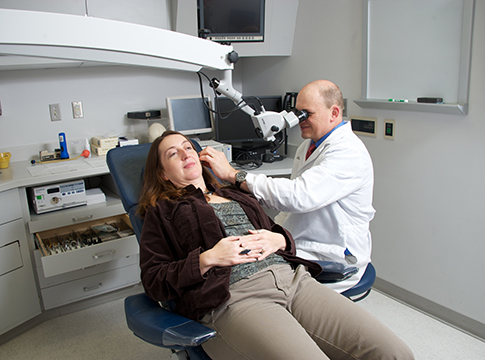Exploring the Area of Otolaryngology: What to Anticipate When You Consult an ENT
Otolaryngology, typically described as ENT, encompasses the diagnosis and treatment of ear, throat, and nose disorders. For those experiencing relevant problems, getting in touch with an ENT professional can provide clarity and alleviation. Recognizing what to anticipate during such consultations is crucial for reliable interaction and treatment. This summary will certainly lay out essential elements of the ENT experience, including typical reasons for brows through and the procedures associated with medical diagnosis and treatment.

Recognizing Otolaryngology: A Summary
Otolaryngology, usually referred to as ENT (Throat, nose, and ear) medication, is a specialized branch of medicine that concentrates on the medical diagnosis and therapy of problems influencing these crucial areas of the body. This field incorporates a variety of problems, including those associated to hearing, equilibrium, respiratory system function, and speech. Otolaryngologists are trained to take care of both medical and clinical therapies, utilizing advanced methods and modern technologies. Their experience extends beyond conventional ailments, dealing with concerns such as allergies, sinus infections, and hearing loss. In addition, they play a crucial role in the management of head and neck cancers, offering thorough treatment customized to specific patient needs. In general, otolaryngology stays vital for keeping wellness and high quality of life in affected individuals.
Usual Factors to See an ENT Expert
Lots of people look for the competence of an ENT professional for a variety of factors, reflecting the diverse nature of problems that affect the throat, nose, and ear. Common issues include chronic sinusitis, which usually brings about persistent nasal congestion and facial pain. Allergic reactions and their associated symptoms, such as itching and sneezing, also prompt visits to these specialists (ENT surgery). Hearing loss, whether steady or abrupt, is one more significant reason for consultation. On top of that, individuals might look for analysis for throat disorders, including relentless hoarseness or swallowing problems. Rest apnea, identified by cut off breathing during rest, is often attended to by ENT experts as well. Each of these conditions highlights the value of specialized treatment in managing intricate ENT-related health and wellness issues
Planning for Your ENT Visit
When preparing for an ENT appointment, it is important to collect relevant details and consider any type of particular worries. Individuals should assemble a detailed case history, consisting of previous ear, nose, or throat issues, surgical procedures, and present medications. Recording signs-- such as extent, period, and frequency-- can give important understandings for the ENT specialist. Furthermore, people need to prepare a list of inquiries they wish to ask, making sure that all problems are dealt with during the check out. Bringing along any pertinent clinical records or examination results can additionally aid the ENT in recognizing the individual's problem. Clients must validate their consultation information, including time, day, and place, to decrease any type of last-minute confusion. Correct preparation can enhance the effectiveness of the assessment and cause far better end results.
What to Anticipate Throughout the Appointment
As the appointment starts, the client can expect to participate in a complete conversation with the ENT expert regarding their signs and symptoms and case history. The professional will ask about the period, regularity, and intensity of symptoms such as hearing loss, click to investigate nasal blockage, or aching throat. Additionally, the client's previous medical problems, medications, and any type of appropriate family background will certainly be examined, helping the expert in developing a total understanding of the individual's health. The ENT might additionally ask regarding lifestyle factors, such as direct exposure to allergens or toxic irritants. This open dialogue develops a foundation for the consultation, making certain that the individual's issues are addressed and establishing the stage for any kind of required evaluations or referrals for treatment.
Analysis Tests and Treatments in Otolaryngology
A range of analysis examinations and procedures are vital in otolaryngology to properly assess and diagnose problems impacting the nose, throat, and ear. Common examinations include audiometry, which gauges hearing function, and tympanometry, evaluating middle ear pressure. Nasal endoscopy permits visualization of the nasal flows and sinuses, while laryngoscopy checks out the throat and singing cables. Imaging techniques, such as CT scans and MRIs, provide thorough views of head and neck frameworks. Allergic reaction testing might additionally be carried out to identify triggers for sinus or breathing concerns. These diagnostic devices allow ENT experts to create a complete understanding of clients' conditions, making sure customized and reliable management plans. Appropriate diagnosis is important for successful treatment end results in otolaryngology.
Therapy Options Provided by ENT Specialists
ENT experts provide a selection of therapy alternatives customized to attend to particular problems impacting the ear, throat, and nose. These therapies range from see this site conventional techniques, such as medication and lifestyle alterations, to more intrusive procedures. Allergies may be taken care of with antihistamines or immunotherapy, while persistent sinusitis may call for nasal corticosteroids or sinus surgical procedure. For hearing loss, ENT experts often recommend listening device or medical treatments like cochlear implants. In situations of throat conditions, choices can include speech treatment or surgeries to remove blockages. Furthermore, they may give advice for taking care of rest apnea, including making use of CPAP tools or surgical interventions. Overall, the objective is to improve people' lifestyle through customized care and reliable therapy approaches.
When to Look For Follow-Up Care With an ENT
When to seek follow-up treatment with an ENT professional is crucial for taking care of continuous signs and symptoms or problems connected to throat, ear, and nose conditions, acknowledging. Clients ought to take into consideration setting up a follow-up consultation if symptoms continue despite preliminary therapy, such as persistent ear discomfort, nasal congestion, or throat discomfort. Modifications in hearing, equilibrium problems, or uncommon nasal discharge might also call for further assessment. Additionally, if a person experiences side impacts from prescribed drugs or has undertaken a surgery, follow-up care is very important to check recovery and resolve any kind of worries. Timely consultations can assure effective monitoring of problems, prevent possible problems, and give tranquility of mind relating to one's wellness. Looking for follow-up care promotes positive health management in otolaryngology.
Often Asked Inquiries

What Credentials Should I Seek in an ENT Professional?
When seeking an ENT expert, one must imp source seek board qualification, relevant experience, and strong individual reviews. Additionally, effective communication skills and a thoughtful strategy can greatly enhance the overall treatment experience.
Exactly how Do I Select the Right ENT for My Needs?
Picking the best ENT professional entails assessing their certifications, experience, and person testimonials (Otolaryngology). It is necessary to ponder their communication style and strategy to therapy, ensuring they line up with the person's specific health requirements and choices
Exist Any Dangers Connected With ENT Procedures?
The threats connected with ENT treatments may include infection, bleeding, anesthesia difficulties, and prospective damage to bordering frameworks. Individuals should go over these threats with their medical professional to recognize individual issues and warranty notified choices.
Exactly How Can I Manage Anxiety Prior To My ENT Appointment?
To manage stress and anxiety prior to a visit, individuals can exercise deep breathing exercises, envision positive end results, prepare questions beforehand, and seek support from good friends or household, cultivating a feeling of confidence and peace.
What Should I Do if I Experience Negative Effects From Treatment?
The person should promptly report them to their health care copyright if side results from therapy occur. Modifications to therapy or additional treatments may be needed to assure safety and security and effectiveness in handling their condition - ENT. As the appointment starts, the individual can anticipate to engage in a detailed conversation with the ENT expert regarding their signs and clinical background. These analysis devices make it possible for ENT professionals to establish a detailed understanding of individuals' conditions, guaranteeing customized and effective administration strategies. ENT professionals supply a selection of treatment alternatives tailored to deal with particular problems influencing the ear, nose, and throat. When looking for an ENT specialist, one ought to look for board certification, relevant experience, and strong person testimonials. Picking the best ENT expert entails evaluating their certifications, experience, and client reviews